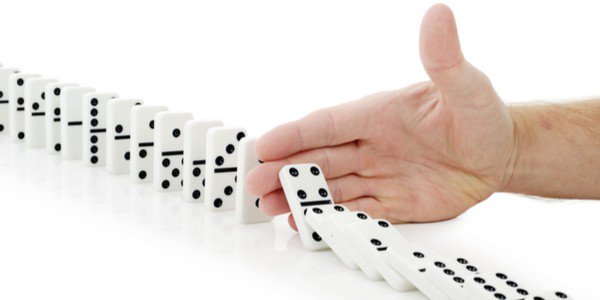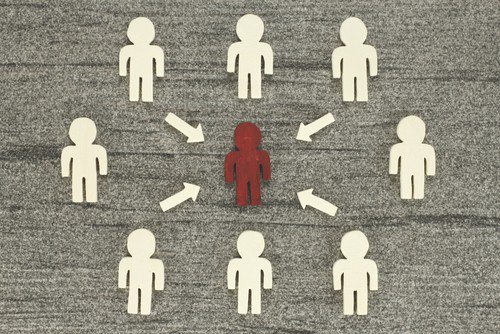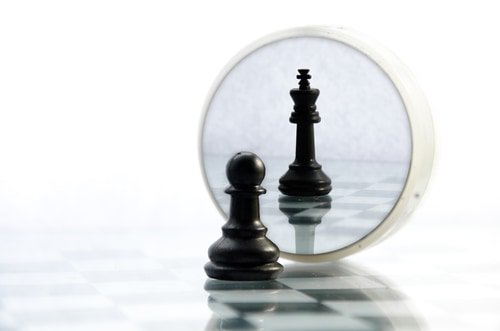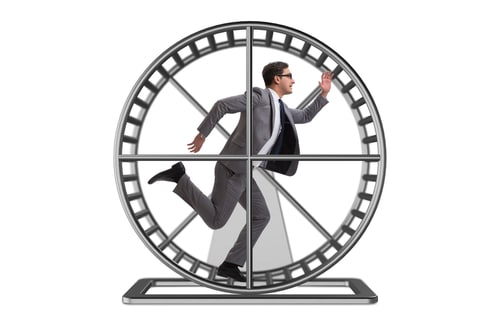We are not discussing diets, wrong morning routines or fitness here. This type of personal growth is far more serious than that. You are about to find out what’s been preventing you from succeeding big time and how to change that.
(By the way, there’s an insightful TEDtalk with Simon Sinek video clip later in this article that you really should watch)
What’s causing procrastination? What’s keeping men deep inside their fragile cocoons? Why is it so hard to take action?
Isaac Newton partially answered all those questions a long time ago. His Third law of motion says, “In an inertial reference frame, an object either remains at rest or continues to move at a constant velocity unless acted upon by a force.” Only, he didn’t define the most optimal source of that force. We will.
Every action has its reaction (the consequence).

Everything around us, including our own lives, obeys to this simple law or causal relationship of things.
The question is how do you tell whether your action or reaction will be optimal?
By learning from the consequences of your deeds over a longer period.
To put it simply, the mistake must happen in order for us to learn. There is no other way.
Which means that fail is not only an option, as we like to say, but also the necessary event that builds up our experience.
But, for the mistake to occur, we have to be in a position to make our own decisions.
Unfortunately, one specific subsequent set of habits, we men commonly share, prevents us from making many of those life-important mistakes. Consequently, when we drop down, we drop with the terminal velocity.
Those habits have developed very early in our lives, without us being in any control over the process.
To change what’s been inherently wrong, we must understand the nature of our pre-programmed habits that are now the weight around our legs, threatening to pull us all the way down in a shithole of life.
Mistake #1 – Allowing too much of the outside influence.

Are you really sure that they all know better than you?
We all do this because we are men. It’s how we were raised. No matter how old do we get, we remain momma boys. The only difference is that the most of us, in one point of our lives, exchange one caring and overprotective woman (mother) for another one (wife). Seems great but it’s not.
In fact, it may turn out to be the serious obstacle for any kind of real personal progress in both private and professional life. A very bad habit that we have developed already in our earliest age, by being too dependent on our parents and mother in particular.
Whether you’ll admit it or not, the fact is that the female influence on our lives is simply overwhelming – for better or for worse.
From the Day 1 of our lives, our brain simply gets used to a fact that we must seek for:
- The approval of our every action, BEFORE we execute.
- Help with even the simplest things.
How do we change that habit to expand our horizons?
We can’t change it entirely because it’s the way we are wired as a species. We have the built-in, unchangeable tendency to co-depend in order to exist.
However, we can reduce the significance of that original habit, which, in return, decreases its influence on our behavior.
It starts simple.
One day, you just dare to make a major decision with the potential to impact your entire, close social circle.
Sounds simple and doable, but there’s this subsequent habit, derived from the original one, that makes us even more dependable on our social environment. Consequently, we are having a hard time with making radical decisions.
Mistake #2 – Heavily relying on other people’s choices.

A drop of water will never follow the same way no matter what you do. It’s just the nature of the chaos around us.
Have you ever played two same poker or chess games? No, you have not.
Why?
Because, if you place a drop of water on top of your palm and let it slide down, and then you drop another one, in the same place, that second one will never follow the same path. Their journey may start from the same position, but the ever-changing environment will keep affecting their directions.
There are 7,4 billions of us now and while we are all starting from the very same place, we are far from being able to follow the same path. It’s just the nature of our extremely dynamical environment.
And yet, against all logic, we are persistently trying to replicate other people’s lives and dynamics.
We do that by blindly following other people’s patterns of behavior.
Again, it’s something caused by the way we are wired. It’s the nature and tendency of our mirror neurons to replicate the chemical consequence of the action made by another person or a group. You’ll feel almost the same chemical consequence as the player who scored the touchdown. You’ll feel sexual arousal just by observing people having sex.
Examples are many; implications, however, may be devastating.
For instance, say you found a role model in some successful individual.
Your brain is automatically trying to copy/paste that person’s path just because you want it. Whenever that person announces yet another achievement, you feel the chemical consequence – a positive excitement. True, on a much lower level than a subject of your immediate interest but it’s happening nevertheless. Which makes you waste time in a desperate attempt to replicate the entire set of completely individual habits and routines.
That simply won’t happen if you are not physically exposed to that environment over the extended period of time.
This entire mechanism is just the learning method.
We are adapting to our environment to increase our survival odds by copying those around us with more experience. We do our best to mimic the behavior of the elderlies during our childhood and we continue doing that during our adult age.
Yet, no matter how efficient that is, it comes with the cost.
As we established by now, we can’t refrain from trying to replicate someone’s routine, which is mission impossible, even if we spend years alongside that person.
No matter how many times that copy/paste policy turns against us, we never stop trying.
Mistake #3 – Repeating the same thing over and over again and expecting different results.

Why do you expect something different to happen if you are repeating the same action over and over again?
Albert Einstein claimed that this is a definition of insanity. We simply can’t think of the sound argument against his rationale.
Why are we doing that?
It’s almost impossible to explain that phenomenon since everything we learn is based on a series of small fails that were adding to our experience, subsequently correcting our mistakes.
Then, one day, out of nothing and for no good reason, we simply stop with that practice.
The only reasonable explanation is that we grow tired (or scared?) of introducing new dynamics in our lives. The intensive period of our adolescent and teenage life seems to end the moment we finish our formal education and land our first job. From that point on, the progress is slow and in most cases, painful. A man can spend the rest of his life without creating some new dynamics in his life. The dynamics, from which he can learn and further evolve.
That lack of interest and willpower to disturb the routine creates yet another devastating habit – perpetual daydreaming!
Mistake #4 – Wanting something else, yet not doing something new.

How about turning daydreaming into planning?
We all heard the famous, “if you want something you’ve never had, you have to do something you’ve never done,” and we could all see the perfect logic in it. However, for some reason, we almost never apply that fundamental principle on our adult lives. Instead, we are only daydreaming about dozens of different alternatives, all connected with the life in abundance.
On the positive side, daydreaming is the most efficient way to come up with new ideas. But our newly developed tendency to refrain from further explorations and trials prevents any significant action that could result in the at least partial materialization of any of those ideas.
Like that’s not enough, there is something else that keeps us deep within our comfort zones.
Mistake #5 – Being afraid to do something you’ve never done before.

What are you afraid of? Were you afraid of climbing that big tree when you were the kid? What has changed?
If you face the situation where on your left there is an approaching pride of hungry lions, while on your right is a river with hypos and crocodiles, which side would you choose as the escape route, provided that moving forward or backward is blocked by the high, smooth, vertical cliffs?
The choice is not important.
What’s important is that you will inevitably move in one of the available directions, no matter the outcome. The situation is simply forcing you to make the choice and react to it – to take the action!
Which means that in order for the young bear to come up from the safety of its lair, after spending his first winter alone, the animal needs a powerful stimulus. In case of our big brown bear, that’s the approaching spring and hunger he feels.
Is he afraid of what might be waiting for him out there? Of course. Just check how he’s slowly and cautiously exiting his winter shelter. Nonetheless, he’s making the move anyway because hunger is a powerful stimulus.
Fear is only here for the bear to remain wary about potential risks and dangers. In some way, fear is the most important companion our bear has on his journey.
And here’s the paradox.
Hunger is forcing the bear into the action. He’s willing to expose himself in order to find the new, more abundant source of food. With fear as his ally, bear’s reflexes are staying sharp. He is able to recognize and react to the potential threat.
How a human being reacts when in bear’s situation?
“It can get worse. Much, much worse. So why leaving the lair when I have a few breadcrumbs left?”
Unlike the bear, we are afraid to use the fear to our advantage, which is, by the way, the predominant role of that sensation and the entire mechanism behind it. We would rather stay hungry and unsatisfied then to change our routine and environment in order to find the new, more abundant source of food.
But there’s another reason for that difference in behavior. And it’s found in a very nature of mammal’s existence.
If the bear would be given the opportunity to have at least minimum supplies all year long, he wouldn’t be moving far from his lair.
The absence of the stimulus would keep the bear in his comfort zone.
Thus, the absence of the stimulus is keeping you in your comfort zone.
What would be the right stimulus?
We built the society where no one is left for dead. Even if you end up broke and homeless, the collective will not allow the ultimate consequence. Social welfare is here to keep you alive. And we are all well aware of that fact, even though we are refusing to publicly admit it.
Thus, hunger is simply not a viable stimulus because it doesn’t exist in our contemporary society. That of course, under the assumption that you are residing in a part of the world where these safety instruments are made available. If not, then you might be forced to take the action even if there is a risk of drowning in a treacherous Mediterranean sea.
Same, we can rule out the remaining 4 essential elements of life: water, air, sleep, and sex.
What’s left?
The one thing that separates us, the humans, from the rest of the mammals and all other living organisms on this planet.
This will sound like a cliché but there’s a reason why clichés exist in the first place.
What bear doesn’t possess and we do is the sense of purpose. Maybe he does but not even closely similar in intensity and potential.
At the end, when you remove everything else from the list of possible stimuli, you are left with the famous purpose!
How to identify your purpose?
Do you know what is the best way to make the sculpture of an elephant from a giant piece of rock?
You carve out everything that is not the elephant.
For many of us, the sense of purpose came very early in our lives. In my case, for example, the revelation came in a form of a simple poster, hung on a wall of my elementary school, inviting 14-year-olds into a police academy. It took less than two seconds to make the decision and start the complex application process of joining the police academy high school.
But then, after going through 4 years of excruciating training and after spending 10 years in the force, I suddenly lost that sense after one significant event. It felt like I fulfilled my purpose, which made my life a living hell.
When the situation was threatening to take the turn from bad to worse, I applied the “elephant sculpting method” and quickly identified a fresh purpose.
You do that by taking some time to reflect on your life and everything you know. After distilling a couple of potential paths, you focus on a level of excitement each of those paths is generating. Then you simply pick the most intensive one. And voila! You are good for the time being.
Trust me; it’s much easier to spend years and years searching for your original (first) purpose than to lose one in the early age.
Where do you begin?
As Simon Sinek says, “Start with Why.”
People make this terrible mistake by focusing on ‘What’ and ‘How’ before they define the ‘Why’. Consequently, they never reach their goals.
The ‘Why’ is providing you with the clear reason for taking an action, whereas the absence of the ‘Why’ is triggering the fear of the unknown.
Why you wanna build something? Why you wanna go there? Why you wanna open a restaurant? Why you wanna build a website or blog about something?
Why do you love your wife?
If you can list the reasons why you love your wife, for instance, you don’t love her. You are merely describing your affection towards the pet.
Which means that if any of the answers imply money alone or some other material possession, remove it from the list of possible purposes. Those obsessed with money are already making money because it’s their passion and purpose. Since you are not spending 18 hours in some brokerage office, you are hardly obsessive about money to the extent where it could serve as a powerful enough stimulus. It can be one of the motivators but not the predominant one.
Thus, you are searching for something that you can’t truly explain with words or draw on a piece of paper. At the same time, whenever you think about it, it feels good – it feels right. And that’s your purpose.
If nothing works, focus on a general purpose of every man on this planet!
And that one is always here. Men are here for a simple purpose: to provide and protect.
In its most basic way, that primary purpose demands that we provide with at least a minimum to ensure the survival of our elemental group: our wives and children.
It’s just the matter of focusing on the maximum instead of minimum and that simple purpose transforms into a life mission, where the well-being of your closest ones is an everlasting drive, pushing you forward even through the darkest hours.
Simply put, make the fear your ally and jump!








